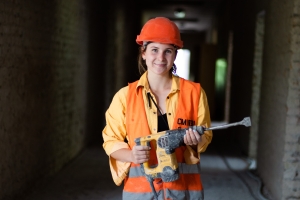
Digging Deep W&L’s Summer Research Scholars program gives students hands-on experience in collaborative research with faculty mentors.
Summer is anything but quiet at Washington and Lee University! While many students return home or travel to complete summer internships, students who participated in the Summer Research Scholars (SRS) program remained on campus to assist faculty members in their research and gain valuable hands-on experience in topics they found interesting or relevant to their studies.
The SRS program supports students participating in collaborative research supervised by W&L faculty, allowing students to develop research techniques, and providing faculty members with welcome assistance in their research endeavors. This year, participants in the SRS program included 64 undergraduate students and 24 supervising faculty, representing a diverse range of academic disciplines.
The opportunity to conduct collaborative summer research with a faculty member is a hallmark of the personalized liberal arts education W&L provides. Students can pursue a subject they are passionate about, gain hands-on experience, and receive mentorship from prominent scholars in the field.
“Working together on research like this shows what a liberal arts education at W&L is all about,” said Kumudu Gamage, visiting assistant professor of mathematics. “It connects theory and real-world practice, creating a lively atmosphere where both professors and students can explore complex challenges. This hands-on work helps us think critically, improve our analytical abilities, and build strong relationships between mentors and students.”
Gamage supervised two students this past summer, Abid Jeem ’26 and Wonjun Jo ’26, and the scholars got down and dirty with their research – literally! The group studied model heat transfer and temperature profiles within the soil with the goal of providing insights into the performance of Ground Source Heat Pump (GSHP) systems in Lexington to ultimately make them more cost-effective. The team first created an experimental setup that they installed up to 10 meters deep in the ground at the W&L farm, and routinely collected and analyzed data on rainfall, soil moisture and temperature to model heat transfer.
Gamage’s research interests are mathematical modeling, the development of green energy technologies, and sustainable practices, and she felt the research conducted over the summer was a “dream combination” of her skills and interests. The interdisciplinary project was also a great opportunity to bring research to life in a tangible and impactful way, and both Jeem and Jo appreciated the hands-on aspects of the work.
For Jeem, who is majoring in physics, the summer reaffirmed his interest in sustainable energy solutions and commitment to pursuing a career focused on addressing environmental challenges. Jo found that he liked the way each day looked different, whether they were reading research papers and coding in Chavis Hall or digging the hole to place the experimental setup. He developed a new appreciation for the research process, realizing how much trial, error and deliberation is required to design and execute an experiment.
Experiencing the challenges and achievements of research first-hand was also a valuable experience for Joyce Yoo ’26, who conducted research under the supervision of Erin Gray, assistant professor of chemistry. Gray’s work aimed to discover new methods to construct carbon-nitrogen bonds in organic molecules, which are prevalent in nature, pharmaceuticals and agrochemicals, and could therefore have medicinal potential. Gray’s broader interests include expanding the toolkit of chemical reactions to make the manufacture of important compounds more sustainable, cost-effective and efficient.
“The most interesting thing I learned during my research experience was that sometimes chemistry doesn’t work the way we think it should,” said Yoo, who is a chemistry major. “This was a great way for me to learn more about the research process, especially getting used to unexpected results and finding new routes to reach the end goal.”
Both Yoo and Gray also appreciated how the SRS program facilitates connections between faculty and students. For Yoo, collaborative research is essential to W&L’s liberal arts education because it introduces students to faculty members across different disciplines and demonstrates real-world applications of research, including her own experience applying chemistry to the pharmaceutical industry.
“Collaborative laboratory research between students and faculty exemplifies active learning,” said Gray, who received grant funding from Organic Syntheses, Inc., to support this research. “By confronting difficult problems in the research laboratory, the answers to scientific problems are no longer found in textbooks or online. Instead, students discover solutions in collaboration with experts. Through this process, students develop as scientists and learn crucial experimental and analytical techniques, [as well as] practical skills such as working in a shared environment and presenting their findings to diverse audiences.”
The opportunity to participate in collaborative research is a distinctly W&L experience and something both the students and faculty members find rewarding. The SRS program provided Bailey Hedgemon ’26 with a research experience she didn’t think would be possible until graduate school, and which has helped shape her academic and career aspirations. Hedgemon conducted research with six other students under the supervision of Ryan Brindle, assistant professor of cognitive and behavioral science. Brindle’s summer research aimed to determine if the heart rate and blood pressure response to mental stress impacts cognition, and students were involved in every step of the process, from testing participants to processing the collected data.
Hollins Pierpoint ’25, a cognitive and behavioral science major, knew she wanted to join Brindle’s research group because of the opportunity it presented to engage with the research process from start to finish and to interact with participants. This experience confirmed her interest in pursuing a career in healthcare. She believes that a collaborative research environment is an important aspect of a W&L education because it allows students to grow in areas beyond the classroom and build relationships with faculty members.
For Brindle, collaborative research is important because it contextualizes the content being taught in the classrooms, gives students a deeper appreciation for the content, and pushes them to think more critically and in more creative and flexible ways. He finds it especially valuable to introduce students to the research process in a hands-on and collaborative environment, and is grateful for the opportunity to help the summer research scholars find their footing in the laboratory. He believes this fosters advanced skill sets that will transfer to any career post-graduation.
“By far my favorite part of summer research is working with the students,” Brindle said. “It is so much fun and so rewarding to see the students, in a relatively short amount of time, learn the research area, learn the methodology, develop the laboratory skills, and then master all of it to the point where they are all self-sufficient in the laboratory. Watching the confidence grow in the students is such a treat.”
Ann Carlton Keller ’25 did not have any lab experience prior to her summer research with Brindle, but working in a small group environment allowed her to dive deep into the topics they were researching and ask questions, providing a more enriching learning experience.
“We learned how to adapt to every kind of situation and work through various problems, which are skills I wouldn’t necessarily have built through a regular class,” said Keller, who is majoring in cognitive and behavioral science. “In my research experience, I learned and developed skills that went far beyond the topic we were studying, which really encapsulates the purpose of a liberal arts education.”
If you know any W&L students who would be great profile subjects, tell us about them! Nominate them for a web profile.
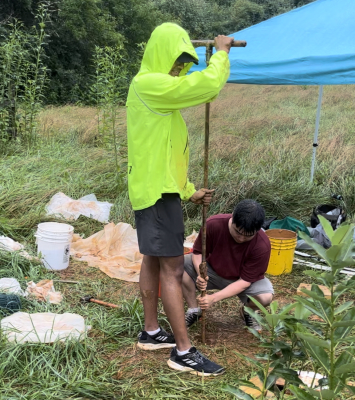 Abid Jeem ’26 and Wonjun Jo ’26 install an experimental setup to study model heat transfer and temperature profiles in the soil.
Abid Jeem ’26 and Wonjun Jo ’26 install an experimental setup to study model heat transfer and temperature profiles in the soil.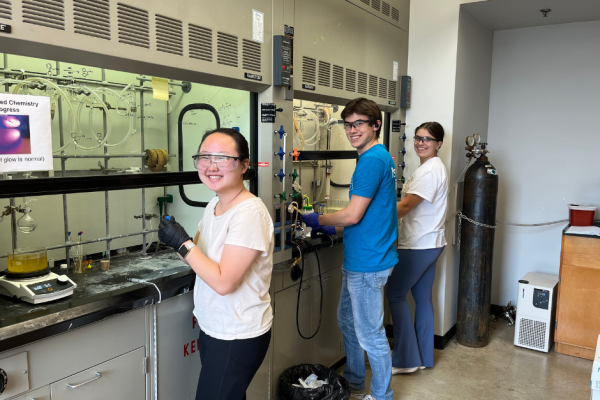 Joyce Yoo ’26 (left) and her SRS research group studied carbon-nitrogen bonds in organic molecules.
Joyce Yoo ’26 (left) and her SRS research group studied carbon-nitrogen bonds in organic molecules.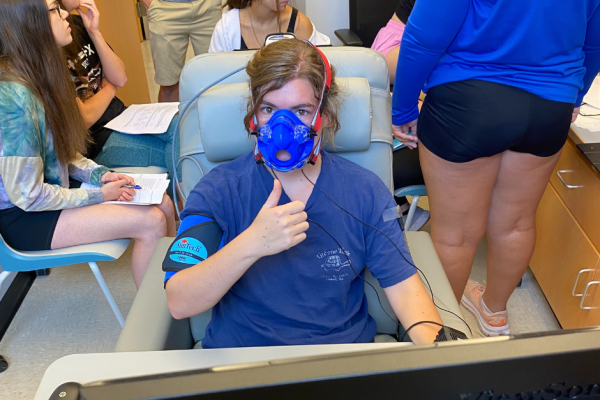 Hollins Pierpoint ’25 in the lab conducting research on the impact of mental stress on cognition.
Hollins Pierpoint ’25 in the lab conducting research on the impact of mental stress on cognition.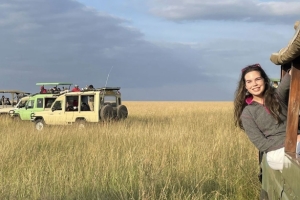

You must be logged in to post a comment.